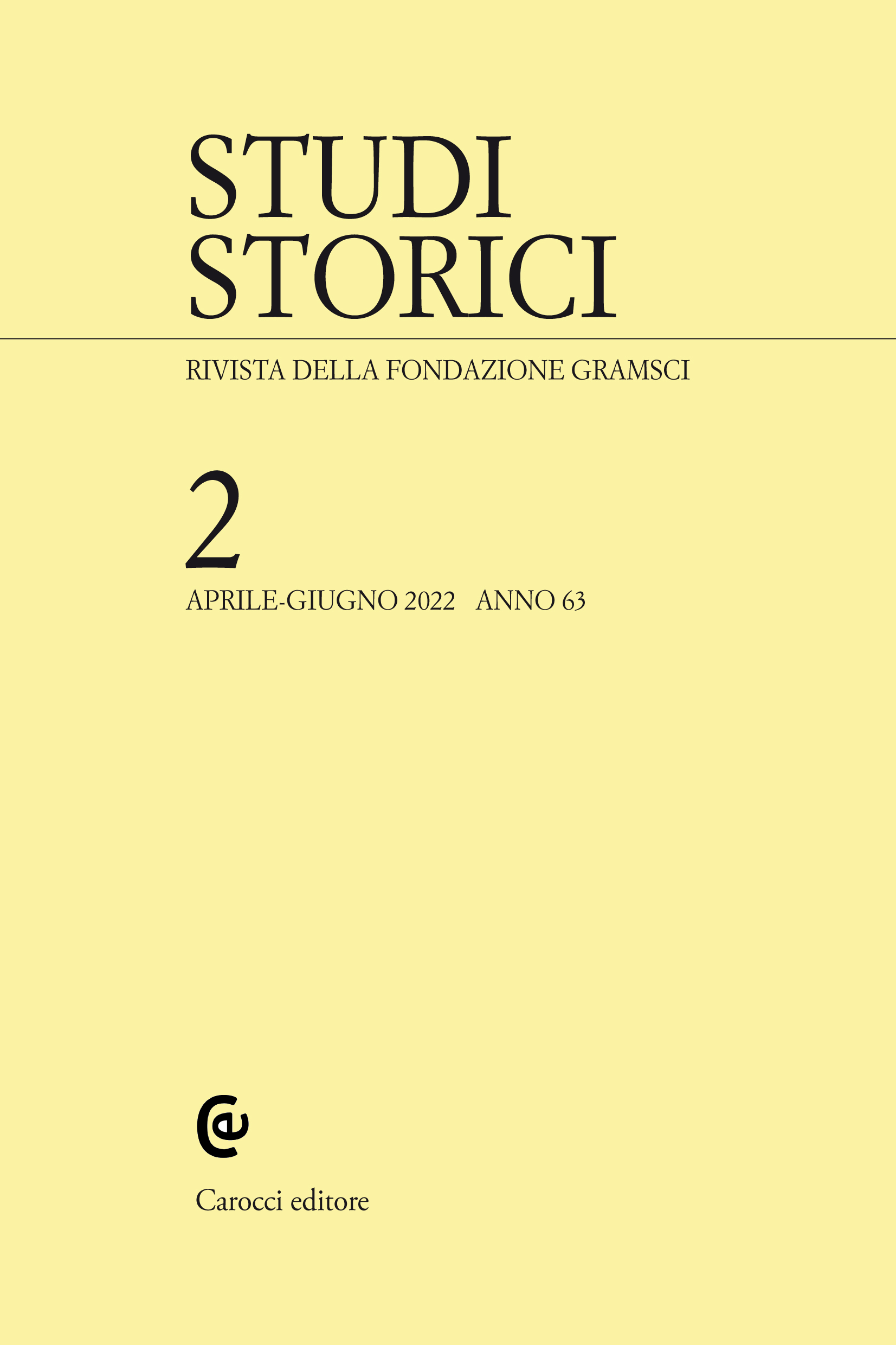
aprile - giugno 2022 anno 63
Sommario e abstract degli articoli
Giovanni Cavagnini, pp. 253-282
«Parole criminose». La locuzione «inutile strage» durante il fascismo (1922-1945)
“Criminal Words.” The Term “Useless Slaughter” under Fascism (1922-1945)
In 1917, Pope Benedict XV called WWI a “useless slaughter” in order to urge the Entente and the Central Empires to settle their differences through diplomacy. When Mussolini rose to power five years later, those words became quite problematic in Italy. On the one hand, the Blackshirts despised them, because they wanted the War to be remembered as a “heroic” one. On the other, Catholics seldom mentioned them, because they were willing to get along with the fascists in order to secure and, after the Lateran Treaty (1929), to defend their religious privileges. As a consequence, only two groups talked about the “useless slaughter” on a consistent basis: anti-fascists in exile (such as Nitti, Lussu, Sturzo), and Catholics from Liguria – i.e. the region where Benedict XV was born.
Keywords: Memory, First world war, Fascism, Catholicism.
Parole chiave: Memoria, Prima guerra mondiale, Fascismo, Cattolicesimo.
Ricerche
Walter Panciera, pp. 283-310
Confine turco-veneziano in Dalmazia e limes mediterraneo dopo Passarowitz (1718-1721)
The Turkish-Venetian Border in Dalmatia and the Mediterranean Limes after Passarowitz (1718-1721)
After the Treaty of Passarowitz, the Republic of Venice and the Ottoman Empire sent two border commissioners to Dalmatia: the future Doge Alvise Mocenigo III, and the sipahi Hacı Mehmed Efendi, member of the Divan. Relying on Venetian archival sources, this article follows the negotiation for defining the border – which began in December 1718 in Herceg Novi and ended only on 6 October 1721 – as well as the various disputes, the solutions adopted, and the interventions by Bailo in Constantinople and by the Grand Vizier. The identification of a definitive point of intersection between the Ottoman and Austrian Empires and the Serenissima (Triplex Confinium), as well as the establishment of a Mediterranean limes as a guarantee for Venetian ships against rampages by Barbary pirates, are of considerable importance.
Keywords: Dalmatia, Border, Republic of Venice, Ottoman Empire, Passarowitz.
Parole chiave: Dalmazia, Confine, Repubblica di Venezia, Impero Ottomano, Passarowitz.
Pierluigi Pironti, pp. 309-340
La rivoluzione in provincia: B raunschweig nella rivoluzione tedesca del 1918-1919
The Revolution in the Provinces: Brunswick in the German Revolution of 1918-1919
The German Revolution of 1918/19 is a complex event that has been given scant attention by German historiography. However, a recent change of perspective, involving both scholars and public opinion, has questioned the origins of German democracy and the relationship between the democratic system after 1918 and the one that began after the end of World War II. The revolution that brought about the first German democracy had many faces, in Berlin, in Hamburg, and in other local contexts. Brunswick, a small industrial town in the middle of the Reich, represented one of the most vital and controversial centres of the revolution, from its beginning in November 1918 until the counter-revolution of April 1919.
Keywords: Revolution, Post-war period, Weimar Republic, Social democracy, Spartacus League.
Parole chiave: Rivoluzione, Dopoguerra, Repubblica di Weimar, Socialdemocrazia, Lega spartachista.
Raffaello Pannacci, pp. 341-371
Nemici, reclusi, forza lavoro. I prigionieri sovietici in mano italiana durante la campagna di Russia
Enemies, Convicts, and Manpower: Soviet Prisoners in Italian Hands during the Campaign in Russia
This article deals with the Soviet soldiers captured by the Regio Esercito during the campaign in Russia. While part of a greater, historiographically well-known tragedy – that of the Red Army’s members under the Germans –, the account of the Soviets in the hands of the Italians has only been treated in studies broad in scope. This essay takes into consideration Italian political and military archival sources in order to outline a broad summary of how concentration camps were run, of the prisoners’ living conditions, and of their treatment by the occupying army, in relation to the military events and logistical problems that this war theatre entailed. The study also aims to assess whether, how, and to what degree the Italian Army’s treatment of the Soviets differed from and/or was better than the Wehrmacht’s.
Keywords: Italian campaign in Russia, Red Army, War imprisonment, Eastern front, Second World War.
Parole chiave: Campagna italiana di Russia, Armata rossa, Prigionia di guerra, Fronte orientale, Seconda guerra mondiale.
Opinioni e Dibattiti
Giulia Delogu, Pasquale Palmieri, pp. 373-406
Chi ha paura del potere? P olitica e comunicazione negli studi sull’età moderna
Who Fears Power? Historical Perspectives on Politics and Communication (16th-18th centuries)y
This essay aims to explain how recent historiography has analysed the relationship between power and communication in the early modern age. The research that was carried out had the merit of fusing together multiple methodological frameworks (those of cultural, intellectual, institutional, political, and economic history), thus succeeding in reconstructing dense networks of linkage among different, distant places and finding the presence of a global system since the beginning of the 16th century. However, current interpretative models do not yet seem sufficient to unveil the information factory. What is missing is a deeper focus on the social, political, and economic forces that shape information and convey communication flows. It is therefore necessary – the authors argue – to refine the investigation tools to identify who builds the news and which powers exercise their hegemony over the infosphere.
Keywords: Media, News networks, Power, Public sphere, Participatory culture.
Parole chiave: Media, Reti informative, Potere, Sfera pubblica, Culture condivise.
Oswald Überegger, pp. 407-440
Crimini di guerra nel primo conflitto mondiale. Per una storia interdisciplinare della violenza
War Crimes During the First World War. For an Interdisciplinary History of Violence
The article deals with the historiographical development of research on war crimes committed by the Central Powers during World War I. It addresses research shortfalls and historians’ disputes, conceiving a phenomenology of war atrocities, based on which various research desiderata are described. The article argues that research on the atrocities of the First World War should be more informed by interdisciplinary concepts and, above all, more comparative. The emergence and concrete forms of atrocities outlined are thus, to varying degrees, influenced by several factors, which are described as situation-immanent, organization-immanent, experience-immanent, and disposition-immanent.
Keywords: First World War, War crimes, History of violence, History of historiography, Central powers.
Parole chiave: Prima guerra mondiale, Crimini di guerra, Storia della violenza, Storia della storiografia, Potenze centrali.
Note critiche
Benedetta Borello, pp. 441-455
Cultura e spazi giuridici della conciliazione in età moderna
Culture and Legal Spaces of Reconciliation in the Early Modern Age
This article reflects on the book by Paolo Broggio, Governare l’odio. Pace e giustizia criminale nell’Italia moderna (secoli XVI-XVII), Roma, Viella, 2021.
Keywords: Peace-making, Reconciliation, Legal spaces, Moral theology, Iconography.
Parole chiave: Paci, Conciliazione, Spazi giuridici, Teologia morale, Iconografia.
Antonella Barzazi, pp. 457-481
«Monaci critici» e lumi. Rilegger e la cultura dei benedettini nell’Impero
«Critical Monks» and the Enlightenment: Reassessing Benedictine Culture in the Holy Roman Empire
This article reflects on the book by Thomas Wallnig, Critical Monks: The German Benedictines, 1680-1740, Leiden, Brill, 2019.
Keywords: Early modern Monasticism, Erudition, Enlightenment, Holy Roman Empire
Parole chiave: Monachesimo in età moderna, Erudizione, Illuminismo, Sacro Romano Impero.
Sfoglia gli altri numeri dell’anno 63 / 2022
Elenco dei fascicoli pubblicati dal 2010
Seleziona fascicolo...
- anno 65 / 2024
- 1
- 2
- anno 64 / 2023
- 1
- 2
- 3
- 4
- anno 63 / 2022
- 1
- 2
- 3
- 4
- anno 62 / 2021
- 1
- 2
- 3
- 4
- anno 61 / 2020
- 1
- 2
- 3
- 4
- anno 60 / 2019
- 1
- 2
- 3
- 4
- anno 59 / 2018
- 1
- 2
- 3
- 4
- anno 58 / 2017
- 1
- 2
- 3
- 4
- anno 57 / 2016
- 1
- 2
- 3
- 4
- anno 56 / 2015
- 1
- 2
- 3
- 4
- anno 55 / 2014
- 1
- 2
- 3
- 4
- anno 54 / 2013
- 1
- 2
- 3
- 4
- anno 53 / 2012
- 1
- 2
- 3
- 4
- anno 52 / 2011
- 1
- 2
- 3
- 4
- anno 51 / 2010
- 1
- 2
- 3
- 4
